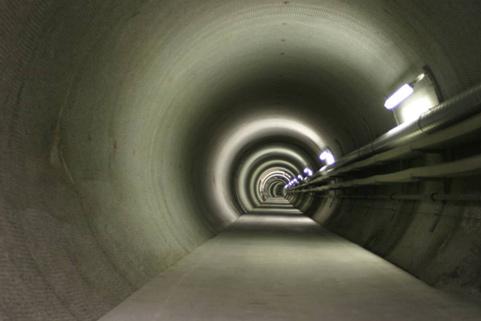
The relationship between time and space is often discussed in relation to art. But recent reflections on time have started to focus on 'Deep Time' or geologic time, a concept which stretches before and after a human perception of time. Of course geologists and deep space astronomers have always been concerned with deep time, but maybe there's a renewed sense of our fragility on earth as the reality of the human impact on the earth's geological structure and ecosystem starts to sink in. Today the most long-term human project is the task of building geological repositories for storing nuclear waste.
The decay rates of radioactive waste present a challenge to the 'Timeline of Timelines' (http://www.cabinetmagazine.org/issues/13/timelines.php. The timeline entry for 2000 is a marker image for a geological repository: "Throughout the late twentieth century, professional semioticians struggle with the problem of constructing an iconographic language capable of communicating radiation dangers long after the death of current languages. Several of these symbolic systems are prepared for nuclear facilities, including the US government nuclear waste storage facility at Yucca Mountain, Nevada." (Sasha Archibald and Daniel Rosenberg, 2004)
On 24th Sept 2012, in London Super-collider presented an evening of talks and films about the 'Deep Future' from geo-time to nuclear semiotics. First up Professor David Smith presented his research on rapid climate change in the ninth millennium, examining how ancient landslides near the Norwegian Fjords caused a Tsunami in Europe which impacted heavily on the British Isles. After a whirlwind of film clips of the future by the curious Aorta Burst Film Club, Dr Dennis Duncan discussed the intrigue of nuclear semiotics. http://www.alluvium-journal.org/2012/07/01/backwards-and-forwards-with-t... As nuclear waste stockpiles around the world, there is an urgent need to deal with it for the future. Although many argue that we should stop producing nuclear waste until we have a scientific method of disposal, we still have the current problem of how to store the waste as safely as possible for hundreds and thousands of years. The current plan is to build gigantic geological repositories in deep rock which can be monitored for 100,000 years or more. Human's have never built anything to last this long, so the semiotic challenge is how to convey the meaning and content of these deadly sites for future generations. The film 'Into Eternity' eerily documents the process of building a geological facility in Finland, http://www.intoeternitythemovie.com/
Here's Lithuania's plans: http://www.vae.lt/en/pages/management_of_long_lived_radioactive_waste
In the UK, Cumbria has just rejected plans to build a nuclear waste repository under the national park.
To get a quick understanding of the short amount of time that humans have existed have a look at this info graphic: http://deeptime.info